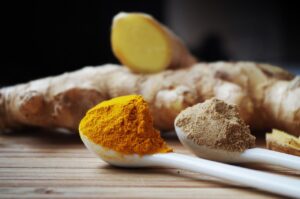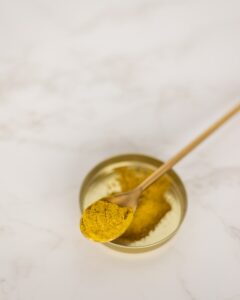Beyond its vibrant color and earthy flavor, turmeric is a powerhouse in the world of alternative medicine. Known by many names like Curcuma and Indian Saffron, it’s not just a kitchen staple but a historical remedy.
Turmeric in Alternative Medicine
I’ll dive into turmeric’s potential as a natural treatment for various ailments. From easing seasonal allergies to reducing arthritis pain, this golden spice has been at the forefront of herbal healing. While it’s celebrated for its possible benefits, we’ll also touch upon the conditions where turmeric may fall short.
Stay tuned as I unravel the mysteries of turmeric, separating the well-researched facts from the hopeful myths. Whether you’re a health enthusiast or just curious, you’re in for an enlightening journey through the world of alternative medicine with turmeric.
Turmeric’s History in Alternative Medicine

When I delve into the world of alternative medicine, turmeric is a standout, hailed for its perceived healing properties. It’s been a cornerstone in traditional medicine for thousands of years, particularly in Ayurveda, the ancient Indian system of medicine. The vibrant yellow turmeric root has been used to make powders, teas, and pastes aimed at treating a plethora of health issues.
Traditional Medicine and Turmeric
In traditional practices, turmeric wasn’t just a spice; it was a symbol of purity, prosperity, and to this day remains a fixture in holistic health discussions. Its active ingredient, curcumin, is lauded for its anti-inflammatory and antioxidant properties. It’s not surprising that in regions like India and China, turmeric was—and still is—used for conditions ranging from minor wounds to more chronic ailments.
Alternative Healing with Turmeric
The principles of alternative healing seek out natural pathways for wellbeing, and turmeric supplements have become increasingly popular in this realm. I’ve come to understand that people are turning to turmeric for its ability to nurture the body without the side effects often associated with pharmaceuticals. It’s important to note, however, that while supplements can offer concentrated doses of curcumin, they should be pursued with guidance from healthcare professionals.
Clinical Trials and Research
Although modern science is still catching up to ancient wisdom, promising results are emerging from clinical trials regarding turmeric’s efficacy. A systematic review of these studies can offer a glimpse into how this golden spice interacts with various health conditions. But as I continue to research, it’s clear that there’s a lot yet to be understood about the full spectrum of benefits turmeric may provide.
The Link Between Turmeric and Colorectal Cancer
There’s an ongoing buzz around the potential role of dietary turmeric in preventing and managing colorectal cancer. While animal studies have shown some promising signs, the jump to human efficacy is significant. Nonetheless, the idea of using a common kitchen spice as part of a cancer treatment strategy is both fascinating and hopeful. Researchers are diligently working to identify whether turmeric could stand as a reliable element in complementary and alternative medicine for cancer patients.
Turmeric’s Potential Benefits

Turmeric in Alternative Medicine
Turmeric, with its golden hue and earthy aroma, is more than just a staple in curry dishes; it has carved out a significant niche in alternative medicine. Derived from the turmeric root, this spice has been a part of traditional medicine for centuries, especially in Ayurvedic practices. Nowadays, people are turning to turmeric supplements as a natural approach to health, intrigued by the compelling anecdotes and potential health benefits supported by clinical trials.
As someone who’s deeply interested in holistic health, I’ve noticed that turmeric doesn’t just add flavor to food; it could potentially offer therapeutic benefits, particularly due to its active component, curcumin. This compound has put turmeric in the spotlight in alternative healing, pivoting its role from a simple kitchen spice to a formidable player in the holistic health arena.
The Impact of Turmeric on Colorectal Cancer
Digging deeper into the targeted effects of turmeric, research continuously explores how it might play a role in cancer treatment, with a keen eye on colorectal cancer. Clinical trials have suggested that dietary curcumin, an important phytochemical found in turmeric, could complement conventional cancer therapies. Its potential lies in its ability to modulate various biological pathways that contribute to cancer development. It’s fascinating to think that this common spice, when transformed into turmeric extracts or taking turmeric supplements, could have such a profound effect on a disease that challenges modern medicine.
Incorporating Turmeric in Daily Lives
In the pursuit of healthy living, it’s not surprising to see that people are integrating turmeric in alternative medicine practices. Whether it’s through sipping on turmeric tea or adding fresh turmeric root to a smoothie, individuals across the globe are eager to harness the benefits of this spice. The convenience of turmeric supplements has made it even easier for people to incorporate turmeric into their wellness routines.
Turmeric as a Natural Treatment for Seasonal Allergies
The Role of Turmeric in Holistic Health
For centuries, traditional medicine has honored turmeric for its health benefits. I’ve always been fascinated by how turmeric in holistic health practices isn’t just about addressing specific conditions but also about contributing to overall well-being. Turmeric supplements have become a mainstay in health food stores, with many turning to them for a natural approach to allergy relief.
The active compound in turmeric, curcumin, has been of special interest in alternative healing with turmeric. It’s not only praised for its potent antioxidant properties but also for its potential to manage histamine levels which play a key role in allergic responses. My experiences with turmeric in alternative medicine for alleviating symptoms like sneezing, itching, and congestion align with findings in recent clinical trials.
Turmeric Root Vs. Supplements
There’s a growing trend for using fresh turmeric root in daily cooking and wellness routines due to its natural and unprocessed nature. However, when I’m seeking more concentrated benefits, especially during allergy season, adding turmeric supplements to my regimen has been helpful. I ensure they are high-quality and contain a significant amount of curcumin to maximise their potential.
Integrating Turmeric Into Daily Routines
I’ve observed that people are exploring innovative ways to introduce turmeric into their diets. Simple methods such as creating turmeric tea or incorporating powdered turmeric into smoothies have made it much easier to enjoy the benefits of this versatile spice. While eating turmeric is a traditional approach, modern-day uses extend to encapsulated supplements for more precise dosing and convenience.
The potential of turmeric in alternative medicine extends beyond allergies. Its use in managing diseases like colorectal cancer has sparked considerable interest. I’ll be keeping a close eye on ongoing research, especially studies relating to turmeric’s role in cancer treatment alongside conventional medical treatment. With each study, the interplay between modern medicine and age-old remedies becomes more intriguing.
Turmeric for Reducing Arthritis Pain

When it comes to alternative healing with turmeric, the bright yellow spice has long been used in traditional medicine to address a multitude of health conditions, including the management of arthritis pain. In my ongoing exploration of turmeric’s benefits, I’ve delved into how this ancient remedy is being re-evaluated in modern holistic health practices, particularly for its pain relief properties in conditions such as rheumatoid arthritis.
The Role of Turmeric in Traditional Medicine and Arthritis
In many cultures, traditional medicine and turmeric go hand in hand. The root has been used for thousands of years to relieve pain and inflammation, two symptoms that are hallmark of arthritis. Current studies are supporting these age-old uses, as turmeric root contains curcumin, its active ingredient, which has been shown to be effective in reducing arthritis inflammation and associated pain.
While dietary turmeric is beneficial, taking turmeric supplements could provide a more potent dose of curcumin that may be required to see a significant reduction in pain. Clinical trials are underway to determine the full extent of turmeric’s impact on arthritis symptoms, with many studies indicating positive outcomes.
Curcumin’s Anti-Inflammatory Action
The anti-inflammatory effects of curcumin are at the forefront of its pain-relieving properties. As a potent anti-inflammatory compound, it works in the body by targeting specific inflammatory pathways at the molecular level. I’ve found that this action can lead to a decrease in swelling and tenderness, making turmeric in alternative medicine a compelling adjunct therapy for those with arthritis.
Integrating Turmeric into Arthritis Management
For those considering integrating turmeric supplements into their arthritis management plan, consistency is key. Supplements come in various forms, including capsules, tablets, and powders, and regular use may contribute to cumulative benefits. However, it should not replace any prescribed medications without a doctor’s guidance.
Turmeric in Holistic Health Beyond Pain Relief
Looking beyond arthritis, turmeric’s curative potential extends to aspects of holistic health that encompass prevention and treatment of various diseases. As I research deeper into this topic, it becomes clear that the applications of turmeric in alternative medicine are vast and continuously evolving.
The Limitations of Turmeric in Alternative Medicine

Understanding the Boundaries of Turmeric’s Efficacy
While turmeric in alternative medicine has been lauded for its potential health benefits, I’ve found during my exploration that it’s crucial to recognize its limitations. Although turmeric supplements and curcumin—turmeric’s active ingredient—have been linked with anti-inflammatory and antioxidant properties, these are not universal cures.
For one, clinical trials often focus on high concentrations of curcumin that are rarely achieved through dietary intake of turmeric. This means that consuming turmeric root in its natural state or as a component of curry powder might not provide the same effect as those studied in clinical settings.
Furthermore, when it comes to serious illnesses such as colorectal cancer, relying solely on turmeric as a form of alternative healing may not be advisable. By comparing traditional medicine and turmeric, it’s apparent that while turmeric can potentially support cancer treatment, it cannot replace proven methods like chemotherapy and radiation. Studies have suggested some benefits for turmeric in combating cancer cells, yet these are adjunctive rather than primary therapies.
Navigating the Hurdles of Turmeric Use
Let’s also consider the practical aspects of taking turmeric as a dietary supplement. Turmeric’s bioavailability is relatively low, meaning our bodies don’t easily absorb a significant amount of the curcuminoids from turmeric, which poses a substantial hurdle in its ability to act therapeutically.
On top of that, when I examined the impact of turmeric on holistic health, I discovered that there are potential interactions with other medications and side effects when taken in large doses. If you’re thinking about turmeric in holistic health, remember that it can impede iron absorption and affect blood clotting. This serves as a reminder that all alternative therapies should be discussed with a healthcare provider, especially if you’re already undergoing conventional medical treatment.
By staying informed of both the advantages and limitations of turmeric in alternative and traditional medicine, we can better position this ancient root in our modern health landscape. While the quest for natural healing is commendable, it’s essential to weigh the scientific evidence and consider turmeric’s place within a broader, integrative approach to wellness.
Takeaway
Turmeric’s role in alternative medicine, especially for arthritis pain relief, is indeed promising. I’ve seen firsthand how a holistic approach can enhance well-being, and turmeric supplements could be a part of that. Remember, though, that high curcumin levels used in studies aren’t typical of a regular diet. And while turmeric has its merits, it’s not a cure-all. It’s essential to approach its use realistically, recognizing that it should complement, not replace, conventional treatments. Always consult with your healthcare provider before making any changes to your regimen. By integrating turmeric thoughtfully into your health plan, you might just find a natural ally in the pursuit of wellness.

